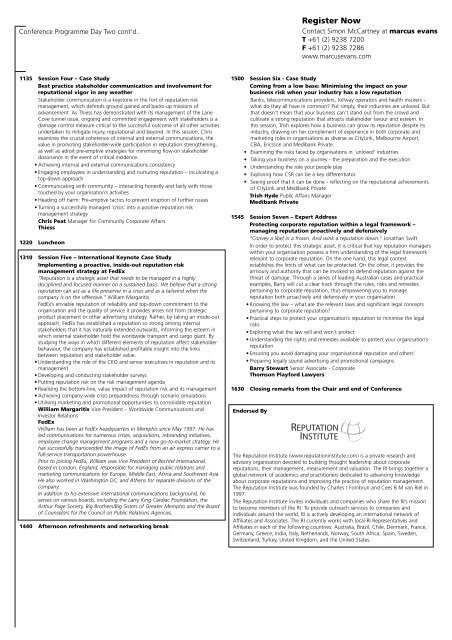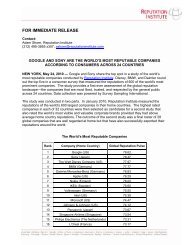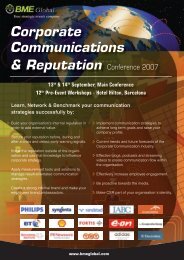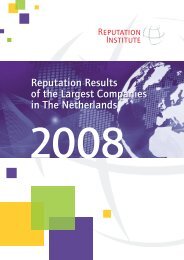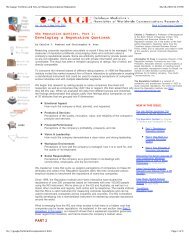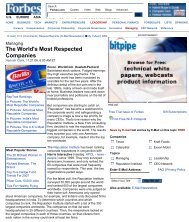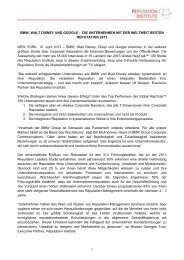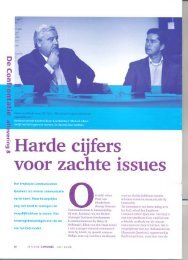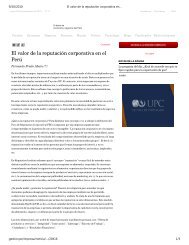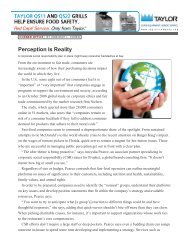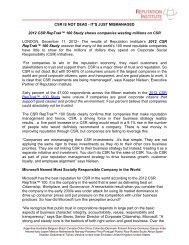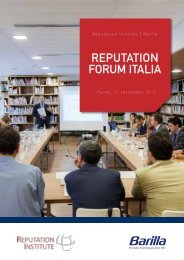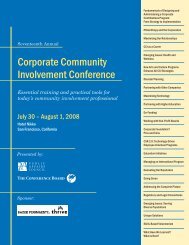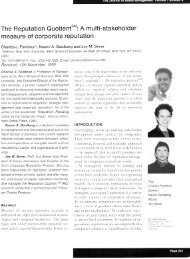Managing Reputation Risk - Reputation Institute
Managing Reputation Risk - Reputation Institute
Managing Reputation Risk - Reputation Institute
You also want an ePaper? Increase the reach of your titles
YUMPU automatically turns print PDFs into web optimized ePapers that Google loves.
Conference Programme Day Two cont’d..<br />
Register Now<br />
Contact Simon McCartney at marcus evans<br />
T +61 (2) 9238 7200<br />
F +61 (2) 9238 7286<br />
www.marcusevans.com<br />
1135 Session Four – Case Study<br />
Best practice stakeholder communication and involvement for<br />
reputational vigor in any weather<br />
Stakeholder communication is a keystone in the fort of reputation risk<br />
management, which defends ground gained and backs-up missions of<br />
advancement. As Thiess has demonstrated with its management of the Lane<br />
Cove tunnel issue, ongoing and committed engagement with stakeholders is a<br />
damage control measure critical to the successful outcome of all other activities<br />
undertaken to mitigate injury, reputational and beyond. In this session, Chris<br />
examines the crucial coherence of internal and external communications, the<br />
value in promoting stakeholder-wide participation in reputation strengthening,<br />
as well as adroit pre-emptive strategies for minimising flow-on stakeholder<br />
dissonance in the event of critical incidence.<br />
• Achieving internal and external communications consistency<br />
• Engaging employees in understanding and nurturing reputation – inculcating a<br />
top-down approach<br />
• Communicating with community – interacting honestly and fairly with those<br />
touched by your organisation’s activities<br />
• Heading off harm: Pre-emptive tactics to prevent eruption of further issues<br />
• Turning a successfully managed ‘crisis’ into a positive reputation risk<br />
management strategy<br />
Chris Peat Manager for Community Corporate Affairs<br />
Thiess<br />
1220 Luncheon<br />
1310 Session Five – International Keynote Case Study<br />
Implementing a proactive, inside-out reputation risk<br />
management strategy at FedEx<br />
“<strong>Reputation</strong> is a strategic asset that needs to be managed in a highly<br />
disciplined and focused manner on a sustained basis. We believe that a strong<br />
reputation can act as a life preserver in a crisis and as a tailwind when the<br />
company is on the offensive.” William Margaritis<br />
FedEx’s enviable reputation of reliability and top-down commitment to the<br />
organisation and the quality of service it provides arises not from strategic<br />
product placement or other advertising strategy. Rather, by taking an inside-out<br />
approach, FedEx has established a reputation so strong among internal<br />
stakeholders that it has naturally extended outwards, informing the esteem in<br />
which external stakeholder hold the worldwide transport and cargo giant. By<br />
studying the ways in which different elements of reputation affect stakeholder<br />
behaviour, the company has established profitable insight into the links<br />
between reputation and stakeholder value.<br />
• Understanding the role of the CEO and senior executives in reputation and its<br />
management<br />
• Developing and conducting stakeholder surveys<br />
• Putting reputation risk on the risk management agenda<br />
• Realising the bottom-line, value impact of reputation risk and its management<br />
• Achieving company-wide crisis preparedness through scenario simulations<br />
• Utilising marketing and promotional opportunities to consolidate reputation<br />
William Margaritis Vice President – Worldwide Communications and<br />
Investor Relations<br />
FedEx<br />
William has been at FedEx headquarters in Memphis since May 1997. He has<br />
led communications for numerous crises, acquisitions, rebranding initiatives,<br />
employee change management programs and a new go-to-market strategy. He<br />
has successfully transcended the image of FedEx from an air express carrier to a<br />
full-service transportation powerhouse.<br />
Prior to joining FedEx, William was Vice President of Bechtel International,<br />
based in London, England, responsible for managing public relations and<br />
marketing communications for Europe, Middle East, Africa and Southwest Asia.<br />
He also worked in Washington DC, and Athens for separate divisions of the<br />
company.<br />
In addition to his extensive international communications background, he<br />
serves on various boards, including the Larry King Cardiac Foundation, the<br />
Arthur Page Society, Big Brothers/Big Sisters of Greater Memphis and the Board<br />
of Counselors for the Council on Public Relations Agencies.<br />
1440 Afternoon refreshments and networking break<br />
1500 Session Six - Case Study<br />
Coming from a low base: Minimising the impact on your<br />
business risk when your industry has a low reputation<br />
Banks, telecommunications providers, tollway operators and health insurers -<br />
what do they all have in common? Put simply, their industries are unloved. But<br />
that doesn't mean that your business can't stand out from the crowd and<br />
culitvate a strong reputation that attracts stakeholder favour and esteem. In<br />
this session, Trish explores how a business can grow its reputation despite its<br />
industry, drawing on her complement of experience in both corporate and<br />
marketing roles in organisations as diverse as CityLink, Melbourne Airport,<br />
CBA, Ericsson and Medibank Private.<br />
• Examining the risks faced by organisations in 'unloved' industries<br />
• Taking your business on a journey - the preparation and the execution<br />
• Understanding the role your people play<br />
• Exploring how CSR can be a key differentiator<br />
• Seeing proof that it can be done - reflecting on the reputational achievements<br />
of CityLink and Medibank Private<br />
Trish Hyde Public Affairs Manager<br />
Medibank Private<br />
1545 Session Seven – Expert Address<br />
Protecting corporate reputation within a legal framework –<br />
managing reputation proactively and defensively<br />
“Convey a libel in a frown, And wink a reputation down.” Jonathan Swift<br />
In order to protect this strategic asset, it is critical that key reputation managers<br />
within your organisation possess a firm understanding of the legal framework<br />
relevant to corporate reputation. On the one hand, this legal context<br />
establishes the limits of what can be protected. On the other, it provides the<br />
armoury and authority that can be invoked to defend reputation against the<br />
threat of damage. Through a series of leading Australian cases and practical<br />
examples, Barry will cut a clear track through the rules, risks and remedies<br />
pertaining to corporate reputation, thus empowering you to manage<br />
reputation both proactively and defensively in your organisation.<br />
• Knowing the law – what are the relevant laws and significant legal concepts<br />
pertaining to corporate reputation?<br />
• Practical steps to protect your organisation’s reputation to minimise the legal<br />
risks<br />
• Exploring what the law will and won’t protect<br />
• Understanding the rights and remedies available to protect your organisation’s<br />
reputation<br />
• Ensuring you avoid damaging your organisational reputation and others’<br />
• Preparing legally sound advertising and promotional campaigns<br />
Barry Stewart Senior Associate - Corporate<br />
Thomson Playford Lawyers<br />
1630 Closing remarks from the Chair and end of Conference<br />
Endorsed By<br />
The <strong>Reputation</strong> <strong>Institute</strong> (www.reputationinstitute.com) is a private research and<br />
advisory organisation devoted to building thought leadership about corporate<br />
reputations, their management, measurement and valuation. The RI brings together a<br />
global network of academics and practitioners dedicated to advancing knowledge<br />
about corporate reputations and improving the practice of reputation management.<br />
The <strong>Reputation</strong> <strong>Institute</strong> was founded by Charles J Fombrun and Cees B M van Riel in<br />
1997.<br />
The <strong>Reputation</strong> <strong>Institute</strong> invites individuals and companies who share the RI’s mission<br />
to become members of the RI. To provide outreach services to companies and<br />
individuals around the world, RI is actively developing an international network of<br />
Affiliates and Associates. The RI currently works with local RI Representatives and<br />
Affiliates in each of the following countries: Australia, Brazil, Chile, Denmark, France,<br />
Germany, Greece, India, Italy, Netherlands, Norway, South Africa, Spain, Sweden,<br />
Switzerland, Turkey, United Kingdom, and the United States.


